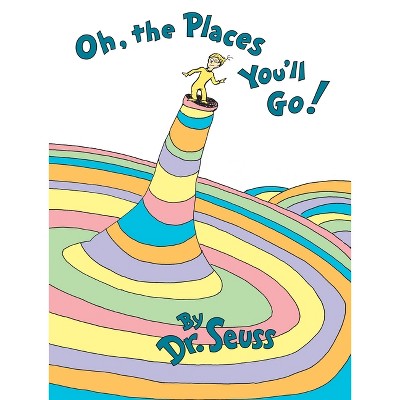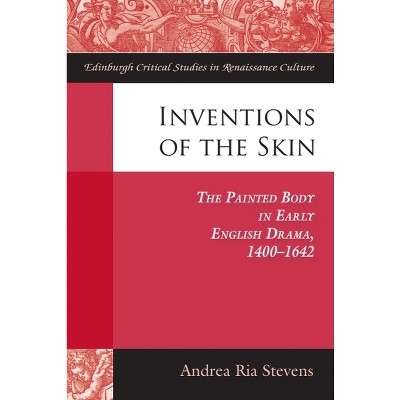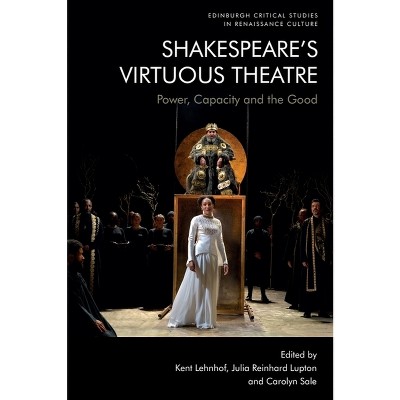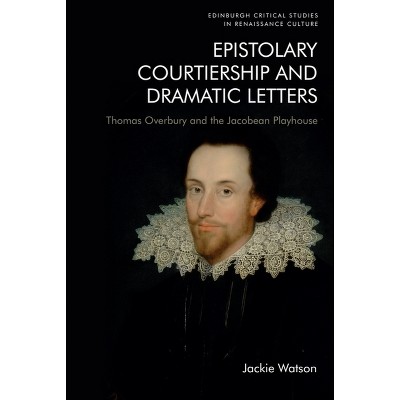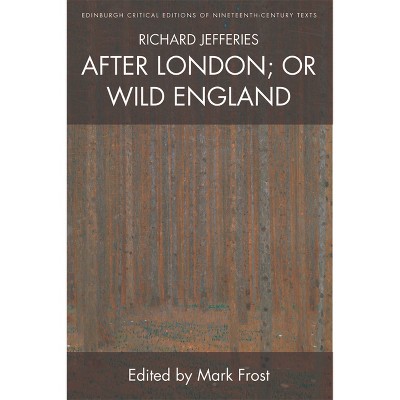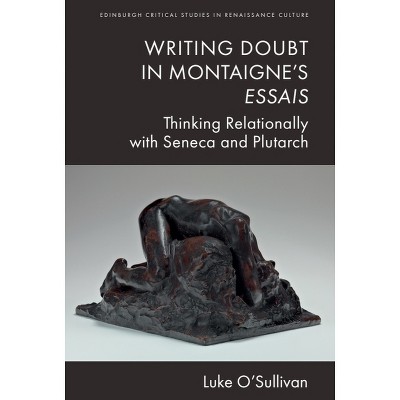Listening for Theatrical Form in Early Modern England - (Edinburgh Critical Studies in Renaissance Culture) by Allison K Deutermann (Paperback)

About this item
Highlights
- Examines the impact of hearing on the formal and generic development of early modern theatreEarly modern drama was in fundamental ways an aural art form.
- About the Author: Allison Deutermann is an Assistant Professor in the Department of English, Baruch College, City University of New York.
- 208 Pages
- Literary Criticism, European
- Series Name: Edinburgh Critical Studies in Renaissance Culture
Description
About the Book
This book traces the dialectical development of auditory modes over six decades of commercial theatre history, combining surveys of the theatrical marketplace with focused attention to specific plays .
Book Synopsis
Examines the impact of hearing on the formal and generic development of early modern theatre
Early modern drama was in fundamental ways an aural art form. How plays should sound, and how they should be heard, were vital questions to the formal development of early modern drama. Ultimately, they shaped the two of its most popular genres: revenge tragedy and city comedy. Simply put, theatregoers were taught to hear these plays differently. Revenge tragedies by Shakespeare and Kyd imagine sound stabbing, piercing, and slicing into listeners' bodies on and off the stage; while comedies by Jonson and Marston imagine it being sampled selectively, according to taste. Listening for Theatrical Form in Early Modern England traces the dialectical development of these two genres and auditory modes over six decades of commercial theatre history, combining surveys of the theatrical marketplace with focused attention to specific plays and to the non-dramatic literature that gives this interest in audition texture: anatomy texts, sermons, music treatises, and manuals on rhetoric and poetics.
Key Features
Invites new attention to the theatre as something heard, rather than as something seen, in performanceProvides a model for understanding aesthetic forms as developing in competitive response to one another in particular historical circumstancesEnriches our sense of early modern playgoers' auditory experience, and of dramatists' attempt to shape it
From the Back Cover
*APPROVED* Edinburgh Critical Studies in Renaissance Culture Series Editor: Lorna Hutson 'The great merit of this book is that it ties the subject of sound to matters which are textually verifiable. While the sounds of the past may be difficult - even impossible - to recover, the evidence of how they were interpreted is not. Listening for Theatrical Form in Early Modern England links cultural history to formalist critical issues, engages with recent work on the senses and reflects the renewed interest in the aesthetic.' Neil Rhodes, University of St Andrews The first book to study the impact of hearing on the formal and generic development of early modern theatre Early modern drama was in fundamental ways an aural art form. How plays should sound and how they should be heard were questions vital to the formal development of early modern drama, and particularly to two of its most popular genres: revenge tragedy and city comedy. Simply put, theatregoers were taught to hear these plays differently. Revenge tragedies by William Shakespeare and Thomas Kyd imagine sound stabbing, piercing and slicing into listeners' bodies on and off the stage; while comedies by Ben Jonson and John Marston imagine it being sampled selectively and according to taste. Listening for Theatrical Form in Early Modern England traces the interconnected development of these two genres and auditory modes over six decades of commercial theatre history, combining surveys of the theatrical marketplace with focused attention to specific plays and to the non-dramatic literature that gives this interest in audition texture: anatomy texts, sermons, music treatises and manuals on rhetoric and poetics. Allison Deutermann is Assistant Professor in the Department of English, Baruch College, City University of New York. She is the co-editor of Formal Matters: Reading the Materials of English Renaissance Literature (2013). Cover image: Cover design: [EUP logo] edinburghuniversitypress.com ISBN 978-1-4744-1126-4 BarcodeReview Quotes
Listening for Theatrical Form significantly advances our understanding of not only how early modern plays worked on the imagination of their audiences but also how the repertory systemworked to create the very audiences the theater needed to be successful.Listening forTheatrical Form offers a valuable supplement to recent scholarship on the emergence of a public sphere in early modern England...--Henry S. Turner "Shakespeare Quarterly"
A valuable contribution to the scholarship.--Darren Freebury-Jones "Notes and Queries"
By assembling vivid evidence for its arguments and advancing subtle, com-pelling, and original readings of plays both familiar and less well known, Listening for Theatrical Form significantly advances our understanding of not only how early modern plays worked on the imagination of their audiences but also how the repertory system worked to create the very audiences the theater needed to be successful.--Henry S. Turner "Shakespeare Quarterly"
The great merit of this book is that it ties the subject of sound to matters which are textually verifiable. While the sounds of the past may be difficult - even impossible - to recover, the evidence of how they were interpreted is not. Listening for Theatrical Form in Early Modern England links cultural history to formalist critical issues, engages with recent work on the senses and reflects the renewed interest in the aesthetic.--Neil Rhodes, University of St Andrews
About the Author
Allison Deutermann is an Assistant Professor in the Department of English, Baruch College, City University of New York. She is the co-editor of Formal Matters: Reading the Materials of English Renaissance Literature (MUP, 2013).
Shipping details
Return details
Trending Fiction

